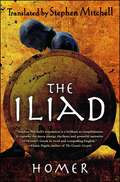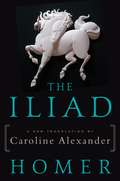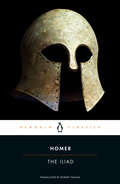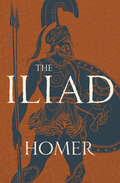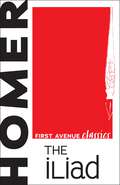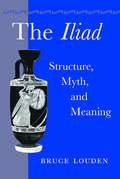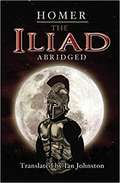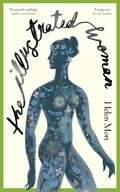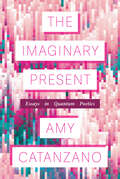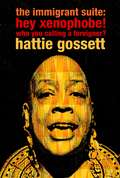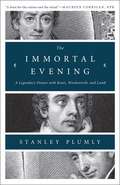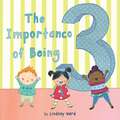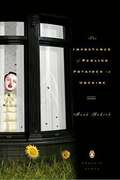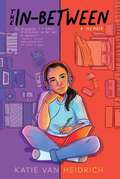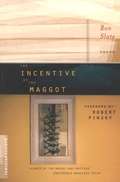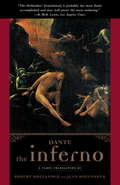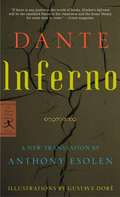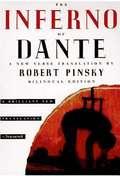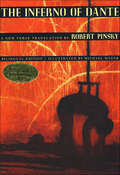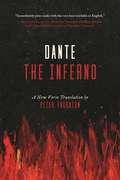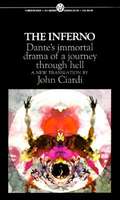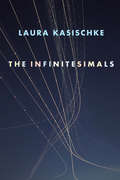- Table View
- List View
The Iliad: (The Stephen Mitchell Translation)
by Homer Stephen MitchellTOLSTOY CALLED THE ILIAD A miracle; Goethe said that it always thrust him into a state of astonishment. Homer’s story is thrilling, and his Greek is perhaps the most beautiful poetry ever sung or written. But until now, even the best English translations haven’t been able to re-create the energy and simplicity, the speed, grace, and pulsing rhythm of the original. In Stephen Mitchell’s Iliad, the epic story resounds again across 2,700 years, as if the lifeblood of its heroes Achilles and Patroclus, Hector and Priam flows in every word. And we are there with them, amid the horror and ecstasy of war, carried along by a poetry that lifts even the most devastating human events into the realm of the beautiful. Mitchell’s Iliad is the first translation based on the work of the preeminent Homeric scholar Martin L. West, whose edition of the original Greek identifies many passages that were added after the Iliad was first written down, to the detriment of the music and the story. Omitting these hundreds of interpolated lines restores a dramatically sharper, leaner text. In addition, Mitchell’s illuminating introduction opens the epic still further to our understanding and appreciation. Now, thanks to Stephen Mitchell’s scholarship and the power of his language, the Iliad’s ancient story comes to moving, vivid new life.
The Iliad: A New Translation by Caroline Alexander
by Homer Caroline AlexanderWith her virtuoso translation, classicist and bestselling author Caroline Alexander brings to life Homer’s timeless epic of the Trojan WarComposed around 730 B.C., Homer’s Iliad recounts the events of a few momentous weeks in the protracted ten-year war between the invading Achaeans, or Greeks, and the Trojans in their besieged city of Ilion. From the explosive confrontation between Achilles, the greatest warrior at Troy, and Agamemnon, the inept leader of the Greeks, through to its tragic conclusion, The Iliad explores the abiding, blighting facts of war.Soldier and civilian, victor and vanquished, hero and coward, men, women, young, old—The Iliad evokes in poignant, searing detail the fate of every life ravaged by the Trojan War. And, as told by Homer, this ancient tale of a particular Bronze Age conflict becomes a sublime and sweeping evocation of the destruction of war throughout the ages.Carved close to the original Greek, acclaimed classicist Caroline Alexander’s new translation is swift and lean, with the driving cadence of its source—a translation epic in scale and yet devastating in its precision and power.
The Iliad: Edited With Apparatus Criticus, Prolegomena, Notes And Appendices: Vol I. , Books I-xii (Enriched Classics Ser. #171)
by Homer Bernard Knox Robert FaglesDating to the ninth century BC, Homer's timeless poem still vividly conveys the horror and heroism of men and gods wrestling with towering emotions and battling amidst devastation and destruction, as it moves inexorably to the wrenching, tragic conclusion of the Trojan War. Renowned classicist Bernard Knox observes in his superb Introduction that although the violence of the Iliad is grim and relentless, it coexists with both images of civilized life and a poignant yearning for peace. Combining the skills of a poet and scholar, Robert Fagles brings the energy of contemporary language to this enduring heroic epic. He maintains the drive and metric music of Homer's poetry, and evokes the impact and nuance of the Iliad's mesmerizing repeated phrases in what Peter Levi calls "an astonishing performance."
The Iliad: From The Text Of Dindorf; Books I-xii (classic Reprint)
by HomerAlexander Pope&’s beautiful verse translation of the Ancient Greek epic of the Trojan War. One of the oldest surviving works in Western literature, Homer&’s epic poem has captivated readers for millennia. Set at the end of the Greeks&’ decade-long siege of Troy, it centers on a quarrel between the Greek King Agamemnon and his greatest asset in battle, the warrior Achilles. From this conflict between two great men, The Iliad weaves a tale of warring nations, vengeful gods, plagues, betrayals, and the terrible consequences of prideful rage. This ebook has been professionally proofread to ensure accuracy and readability on all devices. &“Many consider [Pope&’s translation] the greatest English Iliad. . . . It manages to convey not only the stateliness and grandeur of Homer&’s lines, but their speed and wit and vividness.&” —The New Yorker &“Pope worked miracles. . . ,This is a poem you can live your way into, over the years, since it yields more at every encounter.&” —TheNew York Times
The Iliad: From The Text Of Dindorf; Books I-xii (classic Reprint) (First Avenue Classics ™)
by HomerThe tenth and final year of the Trojan War comes to its climactic end in this infamous Greek epic. With the mighty Achilles brooding on the sidelines of the battle, the Greek army faces almost certain defeat. At the mercy of the intervening gods of Mount Olympus, the legendary warriors of Greece and Troy fight to the death in the name of honor, love, and vengeance. Originally written around 750 BCE, the authorship of this epic poem remains uncertain, but most scholars ascribe it to a blind Greek poet named Homer. William Cowper first published his translation in 1791; this unabridged edition comes from the work edited by Robert Southey, LL.D., with notes by M. A. Dwight, which was published in 1860.
The Iliad: Structure, Myth, and Meaning
by Bruce LoudenExtending his distinctive analysis of Homeric epic to the Iliad, Bruce Louden, author of The "Odyssey": Structure, Narration, and Meaning, again presents new approaches to understanding the themes and story of the poem. In this thought-provoking study, he demonstrates how repeated narrative motifs argue for an expanded understanding of the structure of epic poetry. First identifying the "subgenres" of myth within the poem, he then reads these against related mythologies of the Near East, developing a context in which the poem can be more accurately interpreted.Louden begins by focusing on the ways in which the Iliad's three movements correspond with and comment on each other. He offers original interpretations of many episodes, notably in books 3 and 7, and makes new arguments about some well-known controversies (e.g., the duals in book 9), the Iliad's use of parody, the function of theomachy, and the prefiguring of Hektor as a sacrificial victim in books 3 and 6. The second part of the book compares fourteen subgenres of myth in the Iliad to contemporaneous Near Eastern traditions such as those of the Old Testament and of Ugaritic mythology. Louden concludes with an extended comparison of the Homeric Athena and Anat, a West Semitic goddess worshipped by the Phoenicians and Egyptians. Louden's innovative method yields striking new insights into the formation and early literary contexts of Greek epic poetry.
The Iliad: Translated By Ian Johnston
by Homer Ian JohnstonHomer's Iliad, the oldest and greatest epic poem in our culture, was composed in the eighth century BC. It became the single most important literary resource in ancient Greek culture, and has exercised a decisive influence on Western culture an influence which continues to this day. The poem tells the story of a quarrel between Achilles, the greatest of the Achaean warriors in the Greek expedition against Troy, and Agamemnon, the commander of the expedition an argument which causes Achilles to withdraw from the fighting. The battles continue without him, and the ironic unfolding of events eventually leads him to rejoin the war and to seek out the great Trojan warrior Hector for a climactic single combat. The Iliad is our most important war poem. It constantly forces us to confront what goes on in battle, how men sustain themselves amid the horrors of the killing zone, and how the activity is simultaneous intensely and brutally destructive and also, by one of the strangest of all of life's ironies, intensely creative. Ian Johnston's abridged version of Homer's great poem is based upon his acclaimed translation of the complete epic (also published by Richer Resources Publications). The abridged text is approximately one third of the original and presents a coherent narrative poem in which every line is taken from Homer's text, with occasional short summaries to keep the story coherent. This shortened version is an ideal entry into Homer's vision of the world for those who are not yet ready or do not have the time to tackle the full poem. The text is accompanied by a few explanatory footnotes, a glossary of names, and a map indicating the origin of many of the major characters.
The Iliad: a commentary
by G. S. KirkThis, the fourth volume in the six-volume Commentary on The Iliad being prepared under the General Editorship of Professor G. S. Kirk, covers Books 13-16, including the Battle for the Ships, the Deception of Zeus and the Death of Patroklos. Three introductory essays discuss the role of Homer's gods in his poetry; the origins and development of the epic diction; and the transmission of the text, from the bard's lips to our own manuscripts. It is now widely recognised that the first masterpiece of Western literature is an oral poem; Professor Janko's detailed commentary aims to show how this recognition can clarify many linguistic and textual problems, entailing a radical reassessment of the work of Homer's Alexandrian editors. The commentary also explores the poet's subtle creativity in adapting traditional materials, whether formulae, typical scenes, mythology or imagery, so as best to move, inspire and entertain his audience, ancient and modern alike. Discussion of the poem's literary qualities and structure is, where possible, kept separate from that of more technical matters.
The Illiad
by Homer Richmond LattimoreModern translation of the Greek classic about the Trojan War. Includes a Good introduction.
The Illustrated Woman: SHORTLISTED FOR THE FORWARD PRIZE 2022
by Helen Mort*SHORTLISTED FOR THE 2022 FORWARD PRIZE FOR BEST COLLECTION*'A raw, tender, potent collection' - JESSICA ANDREWS'Gorgeous poems - profound, exploratory, wild, playful - and completely now' - RUTH PADEL________The brilliant new collection from T.S. Eliot Prize and Costa Award shortlisted poet Helen MortLet me kneelbefore the sky and let me be humble, untidy,let me be decorated.Here are women's bodies. Hungry adolescent bodies, fluctuating pregnant bodies, ailing aging bodies. Here are bodies as products to be digitized and consumed. Here is the body in nature, changing and growing stronger. Here are tattooed women through history, ink unfurling across their skin.The Illustrated Woman is a tender and incisive collection about what it means to live in a female body - from the joys and struggles of new motherhood to the trauma of deepfakes. Amidst the landscapes of the Peak District and the glaciers of Greenland, Helen Mort's remarkable poems transfix the reader in a celebration of beauty and resilience.'These are poems that will leave their indelible mark' - ANDREW MCMILLAN
The Image of the Artist in Archaic and Classical Greece
by Guy HedreenThis book explores the persona of the artist in Archaic and Classical Greek art and literature. Guy Hedreen argues that artistic subjectivity, first expressed in Athenian vase-painting of the sixth century BCE and intensively explored by Euphronios, developed alongside a self-consciously constructed persona of the poet. He explains how poets like Archilochos and Hipponax identified with the wily Homeric character of Odysseus as a prototype of the successful narrator, and how the lame yet resourceful artist-god Hephaistos is emulated by Archaic vase-painters such as Kleitias. In lyric poetry and pictorial art, Hedreen traces a widespread conception of the artist or poet as socially marginal, sometimes physically imperfect, but rhetorically clever, technically peerless, and a master of fiction. Bringing together in a sustained analysis the roots of subjectivity across media, this book offers a new way of studying the relationship between poetry and art in ancient Greece.
The Imaginary Present: Essays in Quantum Poetics (Poets On Poetry)
by Amy CatanzanoThe Imaginary Present by award-winning poet and professor Amy Catanzano explores cutting-edge scientific fields such as particle physics and astrophysics, and branches of physics such as quantum theory and relativity, through a poetic vision equally loyal to the imagination and rationality. Drawing upon her groundbreaking research and artist residencies at major scientific research centers like CERN and the U.S. National Science Foundation’s NOIRLab, as well as talks and poetry readings at esteemed institutions, Catanzano invites enthusiasts of poetry and science to consider what can be achieved through greater collaboration between these fields. In linked chapters that fluidly blend lyric essay, literary and scientific analysis, poetry, theory, and memoir, The Imaginary Present offers refreshing new insights on a wide range of thinkers over the past 100 years, including poets Rae Armantrout and M. NourbeSe Philip, novelists Alfred Jarry and Virginia Woolf, comic book writer Grant Morrison, and physicists Albert Einstein and Werner Heisenberg. The introduction explores why poetry and physics are capable of jointly investigating our most fundamental questions about the universe and discusses the history of the art-science connection in addition to the author’s own journey. In searching for the groundbreaking ways that artists and scientists can collaborate, The Imaginary Present offers readers both reasoned grounding and poetic framing for an interdisciplinary poetics and praxis based on science.
The Immigrant Suite: Hey Xenophobe, Who You Calling a Foreigner?
by Hattie GossettWriting from the upper west side of Manhattan, where Harlem intersects with waves of immigrants from the Dominican Republic, Cuba, Puerto Rico, Korea, Cambodia, Ivory Coast, India, Native America, and from all over the globe, Hattie Gossett vividly invokes her neighborhood experience. With wit and candor, she questions why so many people are forced from their home countries, only to be despised as interlopers in the United States; why older immigrants see younger ones as the enemy; who gets paid a living wage, who gentrifies their neighborhood, and who sends their money back home. From the grocery store to the cleaners to the tenement walk-up and everywhere in between, Gossett captures the voices overheard and imagined in this breathless immigrant suite.
The Immortal Evening: A Legendary Dinner with Keats, Wordsworth, and Lamb
by Stanley PlumlyA window onto the lives of the Romantic poets through the re-creation of one legendary night in 1817. The author of the highly acclaimed Posthumous Keats, praised as "full of . . . those fleeting moments we call genius" (Washington Post), now provides a window into the lives of Keats and his contemporaries in this brilliant new work. On December 28, 1817, the painter Benjamin Robert Haydon hosted what he referred to in his diaries and autobiography as the "immortal dinner." He wanted to introduce his young friend John Keats to the great William Wordsworth and to celebrate with his friends his most important historical painting thus far, "Christ's Entry into Jerusalem," in which Keats, Wordsworth, and Charles Lamb (also a guest at the party) appeared. After thoughtful and entertaining discussions of poetry and art and their relation to Enlightenment science, the party evolved into a lively, raucous evening. This legendary event would prove to be a highlight in the lives of these immortals. A beautiful and profound work of extraordinary brilliance, The Immortal Evening regards the dinner as a lens through which to understand the lives and work of these legendary artists and to contemplate the immortality of genius.
The Importance of Being 3
by Lindsay WardThe perfect present for three-year-olds, this picture book is a celebration of all things three! All the best things come in threes, not one, not two, but three, like the three-year-olds in this sweet picture book. As all parents know, three is a big year. Follow along as three friends learn new things in threes—from tricycles to triangles—take a dip in the pool, and play in the park with their friends! Of course, it&’s not all fun and games. There&’s a tantrum and then hugs all around as the three kids head to bed. This adorable picture book celebrating important life events is the perfect gift for third birthdays. Kids will love pointing out all the activities they can do now that they are three years old.
The Importance of Peeling Potatoes in Ukraine
by Mark YakichAn unconventional new collection from a National Poetry Series award winner Mark Yakich 's acclaimed debut collection, Unrelated Individuals Forming a Group Waiting to Cross, examined the blessing and curse of romantic love in its multiplicities. The poems in his new collection approach questions of suffering and atrocity (e.g., war, genocide, fallen soufflés) with discerning humor and unconventional comedy. These poems show how humor can be taken as seriously as straight-ahead solemnity and how we can re-envision solemnity in terms other than lamentation, protest, and memorial.
The In-Between
by Katie Van HeidrichFor fans of Enchanted Air by Margarita Engle and Life in Motion by Misty Copeland, this middle grade memoir in verse with &“stellar writing [and] perfect pacing&” (Kirkus Reviews, starred review) chronicles a young girl and her family who must start over after losing their home.In the early 2000s, thirteen-year-old Katie Van Heidrich has moved more times that she can count, for as long as she can remember. There were the slow moves where you see the whole thing coming. There were the fast ones where you grab what you can in seconds. When Katie and her family come back from an out-of-town funeral, they discover their landlord has unceremoniously evicted them, forcing them to pack lightly and move quickly. They make their way to an Extended Stay America Motel, with Katie&’s mother promising it&’s temporary. Within the four walls of their new home, Katie and her siblings, Josh and Haley, try to live a normal life—all while wondering if things would be easier living with their father. Lyrical and forthcoming, Katie navigates the complexities that come with living in-between: in between homes, parents, and childhood and young adulthood, all while remaining hopeful for the future.
The Incentive of the Maggot
by Ron SlateIn his prize-winning debut collection, Ron Slate seeks out the intersections of art, technology, and humanity with intelligence, wit, and fervor. His unique voice is informed by his world travels as a business executive. As Robert Pinsky writes in his introduction, Slate "brings together the personal and the global in a way that is distinctive, subtle, defying expectations about what is political and what is personal." In Slate's words, "Is this the end of the world? / No just the end / of the language that describes it." Recently published in The New Yorker, Slate has been praised by James Longenbach for his ability to "make the known world seem wickedly strange - a poetry that is utterly of the moment, our moment, because it sounds like nobody else."
The Inferno
by DanteThe epic grandeur of Dante&’s masterpiece has inspired readers for 700 years, and has entered the human imagination. But the further we move from the late medieval world of Dante, the more a rich understanding and enjoyment of the poem depends on knowledgeable guidance. Robert Hollander, a renowned scholar and master teacher of Dante, and Jean Hollander, an accomplished poet, have written a beautifully accurate and clear verse translation of the first volume of Dante&’s epic poem, the Divine Comedy. Featuring the original Italian text opposite the translation, this edition also offers an extensive and accessible introduction and generous commentaries that draw on centuries of scholarship as well as Robert Hollander&’s own decades of teaching and research. The Hollander translation is the new standard in English of this essential work of world literature.
The Inferno (Modern Library Classics)
by Dante Alighieri Anthony Esolen Gustave DoréAn extraordinary new verse translation of Dante's masterpiece, by poet, scholar, and lauded translator Anthony Esolen Of the great poets, Dante is one of the most elusive and therefore one of the most difficult to adequately render into English verse. In the Inferno, Dante not only judges sin but strives to understand it so that the reader can as well. With this major new translation, Anthony Esolen has succeeded brilliantly in marrying sense with sound, poetry with meaning, capturing both the poem's line-by-line vigor and its allegorically and philosophically exacting structure, yielding an Inferno that will be as popular with general readers as with teachers and students. For, as Dante insists, without a trace of sentimentality or intellectual compromise, even Hell is a work of divine art. Esolen also provides a critical Introduction and endnotes, plus appendices containing Dante's most important sources--from Virgil to Saint Thomas Aquinas and other Catholic theologians--that deftly illuminate the religious universe the poet inhabited.
The Inferno of Dante
by Dante Alighieri Robert Pinsky John Freccero Nicole Pinsky Michael Mazur<P>In spite of Dante's reputation as the greatest of Christian poets, there is no sign of Christian forgiveness in the Inferno. <P>The dominant theme is not mercy but justice, dispensed with the severity of the ancient law of retribution.
The Inferno of Dante: A New Verse Translation
by DanteThe prize-winning verse translation of Dante’s epic journey through hell: “splendid . . . fast-paced, idiomatic, and accurate” (Edward Hirsch, The New Yorker).This widely praised version of Dante’s masterpiece, which won the Los Angeles Times Book Prize and the Harold Morton Landon Translation Award of the Academy of American Poets, is more idiomatic and approachable than its many predecessors. Former US Poet Laureate Robert Pinsky employs slant rhyme and near rhyme to preserve Dante’s terza rima form without distorting the flow of English idiom. The result is a clear and vigorous translation that is also unique, student-friendly, and faithful to the original: “A brilliant success,” as Bernard Knox wrote in The New York Review of Books.
The Inferno: A New Verse Translation (Forsyte chronicles)
by Dante AlighieriThis enthralling new translation of Dante’s Inferno "immediately joins ranks with the very best” (Richard Lansing).One of the world’s transcendent literary masterpieces, the Inferno tells the timeless story of Dante’s journey through the nine circles of hell, guided by the poet Virgil, when in midlife he strays from his path in a dark wood. In this vivid verse translation into contemporary English, Peter Thornton makes the classic work fresh again for a new generation of readers. Recognizing that the Inferno was, for Dante and his peers, not simply an allegory but the most realistic work of fiction to date, he points out that hell was a lot like Italy of Dante's time. Thornton's translation captures the individuals represented, landscapes, and psychological immediacy of the dialogues as well as Dante's poetic effects.The product of decades of passionate dedication and research, his translation has been hailed by the leading Dante scholars on both sides of the Atlantic as exceptional in its accuracy, spontaneity, and vividness. Those qualities and its detailed notes explaining Dante's world and references make it both accessible for individual readers and perfect for class adoption.
The Inferno: A Verse Rendering for the Modern Reader
by Dante Alighieri John CiardiThis single volume, blank verse translation of The Divine Comedy includes an introduction, maps of Dante's Italy, Hell, Purgatory, Geocentric Universe, and political panorama of the thirteenth and early fourteenth century, diagrams and notes providing the reader with invaluable guidance. Described as the "fifth gospel" because of its evangelical purpose, this spiritual autobiography creates a world in which reason and faith have transformed moral and social chaos into order. It is one of the most important works in the literature of Western Europe and is considered the greatest poem of the European Middle Ages. Subtitle on the front cover says "Dante's Immortal Drama of a Journey Through Hell.:
The Infinitesimals
by Laura Kasischke"Kasischke's poems are powered by a skillful use of imagery and the subtle, ingenious way she turns a phrase."--Austin American-StatesmanThe Infinitesimals stares directly at illness and death, employing the same highly evocative and symbolic style that earned Laura Kasischke the 2012 National Book Critics Circle Award for poetry. Drawing upon her own experiences with cancer, and the lives and deaths of loved ones, Kasischke's new work commands a lyrical and dark intensity.Laura Kasischke is the author of eight collections of poetry and seven novels. She teaches at the University of Michigan and lives in Ann Arbor, Michigan.
